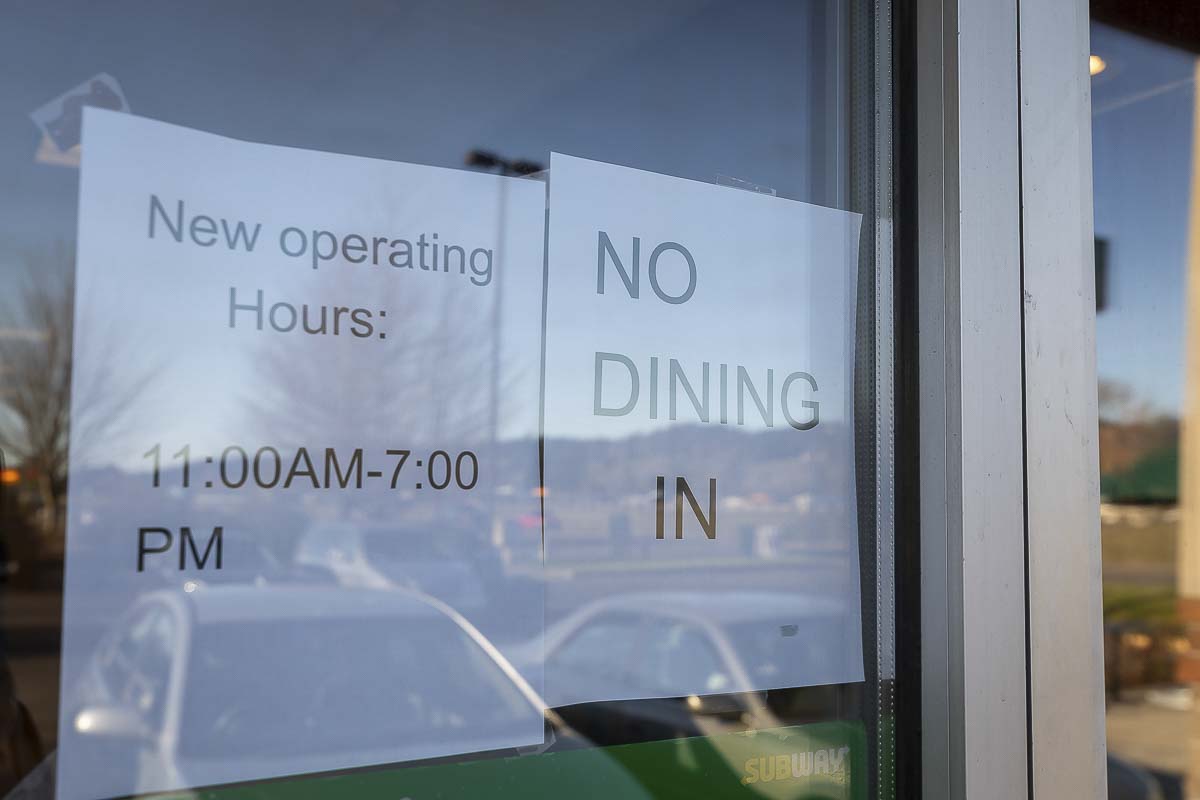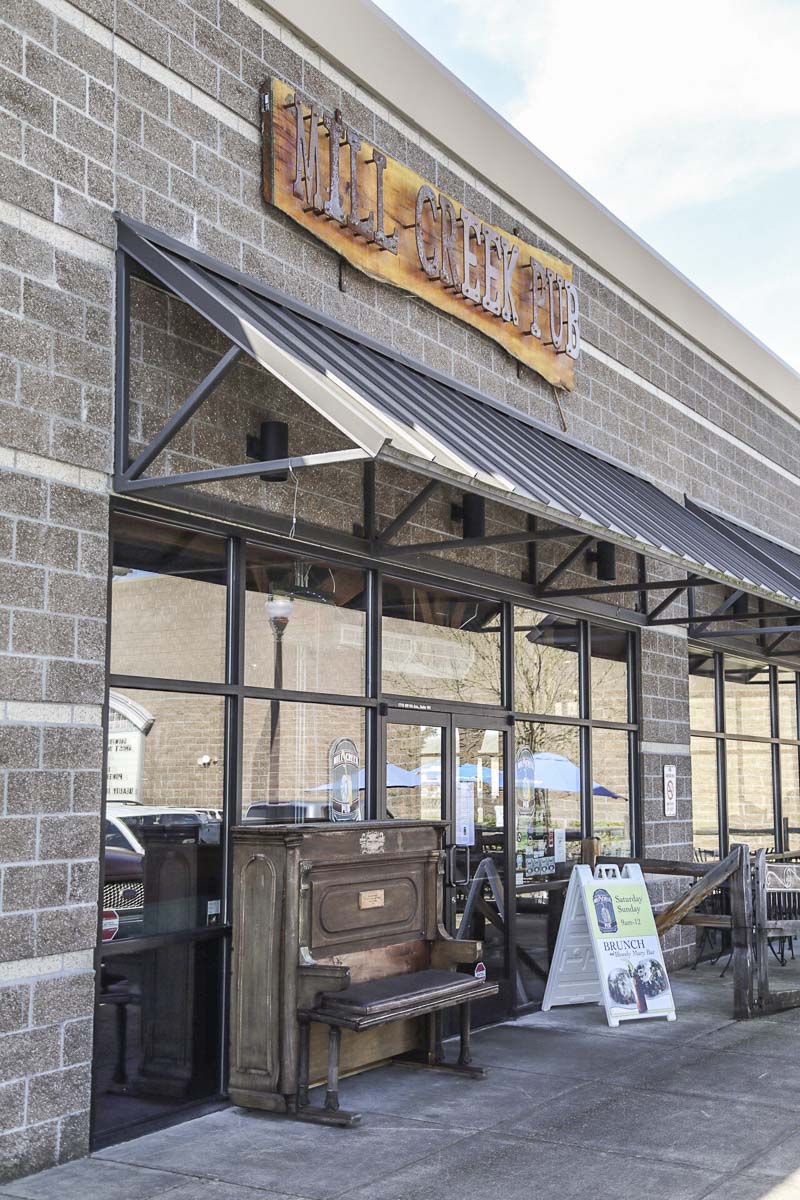Some owners say they may choose to remain closed until Phase 3
VANCOUVER — Few industries have been as impacted by the stay-at-home order designed to stem the spread of COVID-19 as the ones that make our meals for us.

While most restaurants have worked to adapt — switching to takeout, delivery, or both — others have simply shut down. Some permanently, like Hockinson Cafe, Joe’s Crab Shack, or Low Bar in downtown Vancouver. Others, such as Battle Ground’s beloved Mill Creek Pub or The Mighty Bowl, hope to reopen once the coronavirus pandemic has passed.
Restaurants are already a business with a high failure rate. Add in the uncertainty of a pandemic, and it’s likely many won’t make it.
“It’s tough,” says Issa Abudakar, owner of The Petra House in east Vancouver.
The Mediterranean restaurant on NE 18th Street west of 162nd Ave switched to takeout orders early on, but has been treading water with Grubhub deliveries eating up about 40 percent of each purchase and the cost of meat doubling or even tripling as supply shortages rattle the food chain.
“Pretty much, we’re not making any money at all,” Abudakar says. “We’re just keeping afloat.”
The Petra House, like most restaurants during the stay-at-home order, laid off the bulk of its employees. Most of them, even the ones who’ve gotten new jobs in the interim, have said they want to come back, but the longer the shutdown drags on, the more staff members worry they may have to move on.
That situation was exacerbated further in the past week.

Last week, the state announced Clark County was on the list of those eligible to potentially move into Phase 2 of reopening sooner than much of the state.
Under Phase 2 of the governor’s four-phased Safe Start plan, restaurants would be allowed to welcome dine-in customers again, though at half capacity and a maximum table size of five people.
Abudakar says he was confident enough in the county’s move to Phase 2 that he called most of his employees back, and set about implementing safety guidelines recommended by the Centers for Disease Control (CDC) and the state Department of Health.
Then, a COVID-19 outbreak at a fruit packing facility in Vancouver that has grown to 119 cases prompted the state to put an indefinite pause on plans to move forward with reopening.
“I was really devastated,” Abudakar says. “I bought a whole bunch of food, you know. I filled up the whole fridge and freezer and all that kind of stuff. And got the staff back pretty much 80 percent of the schedule, but now I have to kind of cut back again.”
For now, The Petra House is keeping its prices the same. Abudakar says he can’t, in good conscience, ask his customers to bear the brunt of the cost increases.
“Everybody’s pretty much in the same boat,” he says. “I just kind of have to bite the bullet and deal with it.”
Given the rising cost of many food items, potential staffing issues, and uncertainty around the status of reopening, some restaurants say they may wait to welcome patrons inside until Phase 3, rather than risk Phase 2.
There are concerns among some of them that, even when the state approves a move to Phase 2, a new outbreak could force the state to move backwards. There are also concerns that the number of customers allowed inside won’t be enough to offset the cost of bringing staff back on the payroll.
Clark County Councilor John Blom sat in on a conference call with a number of local restaurant owners on Thursday, and says a number of them expressed that it didn’t make financial sense to reopen until Phase 3.
“It was also raised that the timeline to start phase 3 is tied to the start of phase 2, so any kind of prep period for restaurants could potentially delay when we are eligible for phase 3,” Blom wrote in a follow-up email to Clark County Today after the call.
“Based on that input, I think once we move to phase 2 part of the messaging from the county will be for people to reach out to restaurants before going to confirm if they are open, and if not when they plan to open,” said Blom.
As of Thursday, Clark County Public Health said there was no time set for a discussion with Washington Secretary of Health John Wiesman about the pending variance application.
Clark County Public Health Officer Dr. Alan Melnick said during a Board of Public Health meeting on Wednesday that he was cautiously optimistic, given the fact that the variance was paused, rather than denied.

Firestone Pacific Foods outbreak update
There is some reason for optimism. Kittitas County, north of Yakima, was approved on Wednesday to move into Phase 2, following an investigation into an outbreak at Twin City Foods, which sickened at least 20 percent of the company’s workforce and accounted for more than half of the confirmed cases in that county.
The outbreak at Firestone Pacific Foods on Fruit Valley Road in Vancouver has been linked to 119 confirmed COVID-19 cases as of Thursday. Seventy-four of those are employees, and another 45 positive cases have been found in their close contacts. That is out of 169 employees and 138 close contacts who have been tested so far.
Since last Friday, there have been only six new cases of COVID-19 not linked to the Firestone outbreak.
Clark County Public Health says they were meeting with Firestone on Thursday to make sure the company has a plan in place, though no date has been set to reopen. Some employees were seen going in and out of the building on Thursday, though Melnick said the company received permission for a limited work crew to implement safety upgrades recommended by the state.
Washington’s Department of Labor and Industries said Thursday that they were opening an investigation into Firestone, after receiving a complaint from an employee or labor representative on Tuesday.
That complaint alleges the company failed to implement property physical distancing measures, or adhere to workplace practices that protected employees, families and outside contractors.
On Wednesday, Firestone CEO Josh Hinerfeld admitted to The Oregonian Newspaper that the company “could have done better.”
“Through this process, we learned that we didn’t do enough,” Hinerfeld said. “I sure hope through our experience, which obviously has been very painful for many, that others will learn from it.”
Hinerfeld said Firestone had started daily health screenings in March, and required masks as of April 29, but that enforcement of that policy was difficult when employees were on break. Physical distancing was also hard to enforce in a small break room. The company has since installed a tent outdoors with barriers where employees can eat their lunch.
“The first thing is we want to make sure the staff and community is safe, we want to make sure when people come back to work that they feel safe and, gosh darn it, if we don’t get up and running here pretty quickly, we’re going to have a lot of farmers who are going to be in trouble,” Hinerfeld said. “Thank goodness, we have another processor in the Willamette Valley that is processing fresh fruit on our behalf right now. Farmers are harvesting strawberries and blueberries in California. If that product doesn’t get frozen right away, it has to get dumped.”




